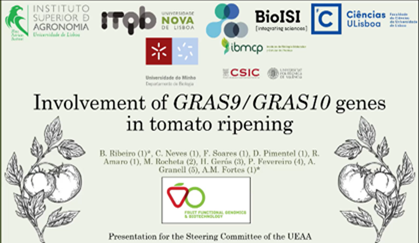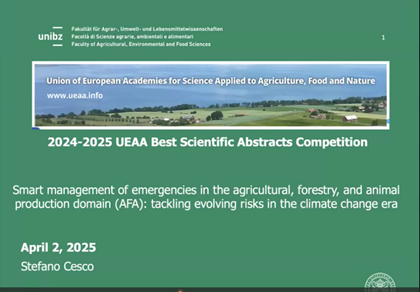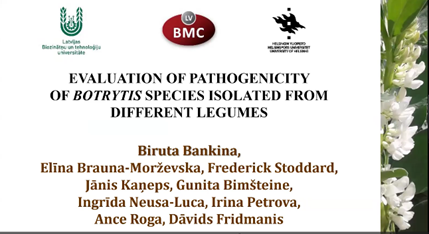
DRAFT MINUTES OF THE SC ZOOM MEETING BUCHAREST
27 06 2025
April, 2nd 2025, Paris, Bucharest, Romania
DRAFT MINUTES OF THE SC ZOOM MEETING BUCHAREST
April 2nd, 2025, h: 10.00 a.m. Paris time, CET time
R E P O R T – MINUTES
Members present:
-
- President – Ioan Jelev (Romanian Academy of Agricultural and Forestry Sciences)
- Vice-president – Nazim Gruda (Academy of Science of Albania)
- Kerstin Niblaeus (Swedish Academy of Agriculture and Forestry)
- Michel Duclos (French Academy of Agriculture)
- Vasile Botnari (Academy of Agricultural and Environmental Sciences of Moldova)
- Violeta Bozhanova (Agricultural Academy of Bulgaria)
- Simone Orlandini (Accademia dei Georgofili, Italy)
- Vilém Podrázský (Czech Academy of Agricultural Sciences)
- Hojka Kraigher (Slovenian Academy of Sciences and Arts)
- Michel Thibier, UEAA President’ Counselor (French Academy of Agriculture)
Members absent:
- Evi Arachoviti (Great Britain, Royal Agricultural Society of England/ Innovation for Agriculture) – excused
- Elena Horská, UEAA former president (Slovak Academy of Agricultural Science) – excused
- Baiba Rivža (Latvia Academy of Agricultural and Forestry Sciences) –excused
Observers and alumni absent:
- Shamil Ibatullin, observer (National Academy of Agrarian Sciences of Ukraine)
- Anuch Balian, observer (National Academy of Agrarian Sciences of Ukraine)
- Zenonas Dabkevičius, Alumni member (Lithuanian Academy of Sciences) – excused
Others present:
- Carmel Cahill, head of the UEAA EWG on CAP
- Mario Pezzotti, head of the UEAA EWG on gene editing
- Beatriz Ribeiro, Rute Amaro, P. Fevereiro, winners of UEAA abstract competition 2024
- Stefano Cesco, winner of UEAA abstract competition 2024
- Biruta Bankina, winner of UEAA abstract competition 2024
The members deliberated on the following Agenda:
- Welcome address by President.
- Analysis and approval of the Draft Minutes of the UEAA Steering Committee of December 17, 2024, Bucharest.
- Updates: EWG on CAP and Forest strategy.
- “Best Scientific Abstract Competition 2024” – presentation of the winning abstract and scientific discussion. Moderators: Nazim GRUDA, Michel DUCLOS.
- Analysis and approval of the activity of the EWG on gene editing regarding the preparation of a document supporting the Polish presidency position on this subject, with a view to its transmission to the EU Commission.
- Information regarding the discussions with the President of ALLEA, Paweł ROWIŃSKI about possible future collaborations between UEAA and ALLEA.
- Discussion of requests received from ALLEA regarding the support of a Statement concerning the halting of some researches in US and the support for the researchers affected by these measures, especially for those in the field of entomology.
- About the attracting of new members with Observer status
- Newsletters
- Own budget for UEAA. Possibilities and suggestions.
- Miscellaneous
- Close of the meeting (12:00)
Agenda item 1 – Welcome address by President
The President Ioan Jelev opened the meeting and welcomed all participants. He asked Members if they agreed with the proposed Agenda or have comments concerning it.
- The meeting Agenda was unanimously approved.
Agenda item 2 – Analysis and approval of the Draft Minutes of the UEAA Steering Committee of December 17, 2024, Bucharest.
The draft minutes of the UEAA SC meeting, held on December 17, 2024, circulated electronically to members and all comments/corrections received were incorporated. There were no further comments.
- The SC meeting Minutes was unanimously approved.
Agenda item 3 – Updates: EWG on CAP and Forest strategy.
President Jelev invited Carmel Cahill to tell a few words about the EWG on CAP and what would be the next step in continuation of this cooperation.
Carmel Cahill stressed that it is really important that UEAA actually has a formal position in all of these debates and this year is an extraordinarily important year because it is the year with so much activities going on in terms of the next phase of CAP, having in view that important changes are going on in the world with an impact on all of that. This is the year when the Commission will begin to evaluate the current version of the National Strategic Plans that are in place at the moment. She also said that the most important thing is the timetable, the Commission already planning to present a regulation, a proposal, which is due by mid-2025, and a major Commission report to the European Parliament on the implementation of the current CAP at the end of the year. She concluded by saying that she is willing to continue and work with the group.
President Jelev thanked Carmel and asked colleagues if they have some comments.
Prof. Thibier said that it is very important what Carmel said about the fact that 2025 is a very important year for the implementation of the CAP. He believes that the UEAA must be an actor in that field, all agricultural academies in Europe obviously have some interest in the preparation of the CAP project, so the UEAA should be able to state a position paper and highlight the main points of discussion that will reflect the opinion of the European academies. He encouraged everyone present at the meeting to mobilize and help Carmel make this EWG work.
Kerstin thanked Carmel for the excellent work she has done so far and said that it would be a real pity if UEAA could not keep this up, expressing hope that UEAA can manage to find broader representation.
It was decided that President Jelev to send an e-mail of requirements to the UEAA members to contribute with proposals and involvement in putting in force again the CAP EWG and he asked Carmel if she has some suggestions about some particular colleagues that can be involved in this group to send him their name and he will try to address them also.
Next, Prof. Jelev invited Kerstin Niblaeus to say a few words about Forest Strategy.
Kerstin made a brief information about the deforestation regulation which actually aims problems in third Countries, but also tend to affect European countries, because it all leads to rather heavy administrative burden and so the entry into force has been postponed until the end of this year. The second topic was forest monitoring and she said the Council is likely to achieve the first agreement in June at the European Parliament and after that there will be negotiations between the Council and the Parliament.
The third one, that is really in an important stage right now, is nature restoration regulation, sometimes called nature restauration law, it has entered into force, it is regulation, so it is very binding but at the same time it is framework, the Member States are now supposed to make their own action plans and in September next year they have to send these draft action plans to the Commission. will give their views and then they have some more time to finalize the plans. She said this is ongoing now, each EU Member States has to make these kinds of plans, and at the Swedish Academy they have started to build up a network of interested European countries.
At some stage, she said, we should try to organize a meeting with the forestry team in the EU Commission, but they need time to settle in their new organization and she will find out more about that.
Hojka Kraigher asked Kerstin if they would also consider participating in the discussion on the proposal for the new regulation on forest productive material (FRM) and official control regulation (OCR), as she is very involved in this topic and most countries were opposed to implementing the OCR in forestry (which would need enormous changes and parts only applying to FRM) since the official control system was well detailed and implemented in the current Directive EC/105/1999 which is supposed to be replaced by the new Regulation on FRM – the proposal by a number of member states (MS) is for the official control to be incorporated into the new FRM Regulation (this latter is still in the modifications phase) and Kerstin replied that it was also important.
President Jelev thanked Kerstin for her presentation and emphasized the importance of the activities she informed about and kindly asked the member academies (invited) and SC members if they were interested in participating in these activities held at the Royal Swedish Academy.
Agenda item 4 – “Best Scientific Abstract Competition 2024” – presentation of the winning abstract and scientific discussion.
President Jelev thanked Michel Duclos and Nazim Gruda for their strong support and dedicated involvement in the entire process of this competition, as well as the other SC members who were involved in the abstracts evaluation team, a competition in which 28 abstracts were initially proposed. He congratulated all participants and winners for their important involvement.
Prof. Jelev invited Michel Duclos to say a few words about the competition and to moderate this scientific session.
Dr. Duclos noted the excellent participation, the very good works and explained the process of selecting best scientific abstracts (information available on the UEAA website: www.ueaa.info).
He announced the winning abstracts:
| First place:
– Involvement of GRAS9/GRAS10 genes in tomato ripening (authors: B. Ribeiro, C. Neves, F. Soares, D. Pimentel, R. Amaro, M. Rocheta, H. Gerós, P. Fevereiro, A. Granell, A.M. Fortes) |
 |
| Second place:
– Smart management of emergencies in the agricultural, forestry, and animal production domain: tackling evolving risks in the climate change era (authors: Stefano Cesco, Davide Ascoli, Lucia Bailoni, Gian Battista Bischetti, Pietro Buzzini, Monica Cairoli, Luisella Celi, Giuseppe Corti, Marco Marchetti, Giacomo Scarascia Mugnozza, Simone Orlandini, Andrea Porceddu, Giovanni Gigliotti, Fabrizio Mazzetto) |
 |
| Third place:
– Evaluation of Pathogenicity of Botrytis Species Isolated from Different Legumes (authors: E. Brauna-Morževska, F.L. Stoddard, B. Bankina, J. Kaņeps, G. Bimšteine, I. Neusa-Luca, I. Petrova, A. Roga & D. Fridmanis) |
 |
Then, the authors of the winning abstracts were invited to make a short presentation of their research findings, followed by Question & Answers session.
Michel Duclos thanked the free speakers for their excellent presentation, colleagues for their questions and discussions, and reminded and encouraged member academies to stimulate their colleagues to submit new abstracts for the new competition, which is already open for this year (information available on https://ueaa.info/scientific-news/).
President Jelev thanked everyone again and added that certificates have been prepared for the winning abstracts, which will be sent to the authors electronically.
Agenda item 5. Analysis and approval of the activity of the EWG on gene editing regarding the preparation of a document supporting the Polish presidency position on this subject, with a view to its transmission to the EU Commission.
President Jelev thanked in particular Professor Mario Pezzotti for accepting to take over the leading of the EWG on gene editing, a very important field of research, as well as Michel Thibier for his support in this transition of the EWG from him to Mario. He invited Mario to present the outputs of this activity at this moment, saying that afterwards there would be open debates for any questions, comments or suggestions.
Prof. Mario Pezzotti thanked Michel Thibier, Simone Orlandini and all the people involved in the academies for their confidence in appointing him as head of this EWG which deals with such an important, current and relevant topic, and gave a brief presentation.
Prof. Jelev thanked Mario Pezzoti for this very important contribution, for the overview of this process, the elaboration of a document, for presenting a point of view of all these three partners in this negotiation and for the first drafting of this position. He understood that in EWG opinion the Commission’s approach is the most scientifically acceptable. President Jelev said he thinks necessary to have a next meeting before the next SC for a final point of view asking members presents for their inputs/comments.
As a conclusion, Prof. Thibier said the document sent by Mario is excellent and proposed to have a position paper that Mario would draft from these documents and select the options that the EWG gives us, paper which will be the UEAA position paper. The document could be sent to the UE Commission by mid-April. He also added that it would be good to post it on the UEAA website.
Kerstin Niblaeus said that what is very important now is to get a position statement in the process as soon as possible, and after Mario has made this summary she would like to clarify it with the presidency of Sweden Academy as well. She also added that the Council and the Parliament are important actors and, in her opinion, it is important to get it into the Council, and the Polish Presidency, and also to pass this statement on to our governments, who will all be active in this trialogue.
Simone Orlandini congratulated Mario for the excellent presentation and analysis of the documents and stated that he strongly supports Michel’s proposal that Mario and the EWG prepare a UEAA position paper, which can produce an official position.
Mario thanked all for their words and underlined that what’s important now is to really promote genetic innovation. A genetic innovation that is environmentally safe, safe for the human beings, animals and would reach the sustainability in agriculture.
Michel Thibier suggested three things to Prof. Jelev: first, Mario’s responsibility to draft a position paper to send to President Jelev and, of course, to the interested academies, such as the Swedish Academy. He also agreed with Kerstin’s idea and said that it should be sent to the Commission and also to the Council and, perhaps, to the Parliament. The Document must also to be posted on the UEAA website.
In conclusion, President Jelev asked Mario to finalize this draft as soon as possible, by April 18-2025, to distribute it not only within the EWG, but especially to all SC members for input, and for members to consult with their academies and, after receiving final approval from all SC members, to proceed with sending it to the Commission, as well as to the Council and Parliament.
Agenda items 6 and 7. Information regarding the discussions with the President of ALLEA, Paweł ROWIŃSKI, about possible future collaborations between UEAA and ALLEA and Discussion of requests received from ALLEA regarding the support of a Statement concerning the halting of some researches in US and the support for the researchers affected by these measures, especially for those in the field of entomology.
President Jelev thanked vice-president Nazim Gruda for his strong support in contacting the ALLEA President and informed the members about the online meeting that he, together with Michel Thibier and Nazim Gruda, had with President Pawel Rowiński, on February 12, to identify possible future collaboration between the two organizations. He recalled that the main aspects of the discussions were reflected in the document prepared by Vice President Gruda, which was sent by e-mail to all SC members on February 20. Given that the ALLEA President suggested identifying larger-scale activities that both organizations could jointly organize, such as workshops, small-scale symposia in the field of agriculture, food, environment, climate change, as well as joint statements, Prof. Jelev asked the members to consider these possibilities and to send him some proposals for further developing cooperation with ALLEA. For concrete steps in this regard, Pawel Rowinski proposed a new meeting, after discussing it with their board of directors, somewhere in April or May.
Vice-president Gruda asked the members to send him and Simone Orlandini, who proposed the creation of a working group involved in the relationship with ALLEA, some points of cooperation with ALLEA (e.g. joint workshops, small symposia and even small statement), to discuss them in the next SC meeting in June.
Prof. Simone confirmed his availability to work in this direction and said that he would prepare something that would be sent to President Jelev and Vice-president Nazim to initiate internal discussions and have a document ready for the next SC.
It was agreed to postpone the discussion to the next meeting.
Agenda item 8. About the attracting of new members with Observer status
Postponed
Agenda item 9. Newsletters
President Jelev stated that, thanks to the efforts of Vice-president Nazim, there is good planning of the newsletters and all issues have appeared on time.
Agenda item 10. Own budget for UEAA. Possibilities and suggestions.
President Jelev said that this point was a proposal by Vice President Nazim, that UEAA should have its own budget, and he requested suggestions from UEAA SC members.
Agenda item 11. Miscellaneous.
Michel Duclos reminded members about the launch of the Best Abstract Competition 2025, which had not yet received any proposals, and said that everyone should stimulate new proposals.
President Jelev strongly supported Michel Duclos and thanked him for his intervention. The President also announced the completion of the draft proceedings volume from the October UEAA symposium.
The President thanked all SC members for their attendance and contributions and declared the meeting closed.